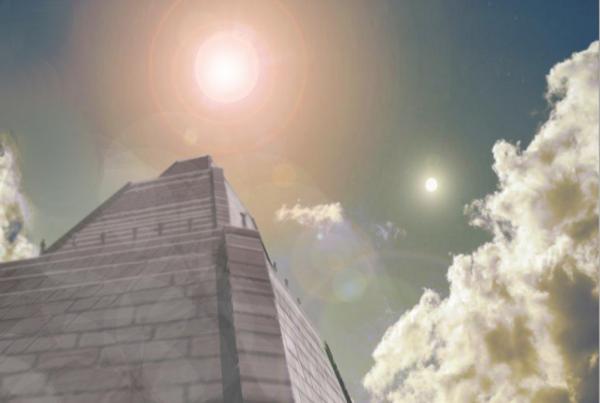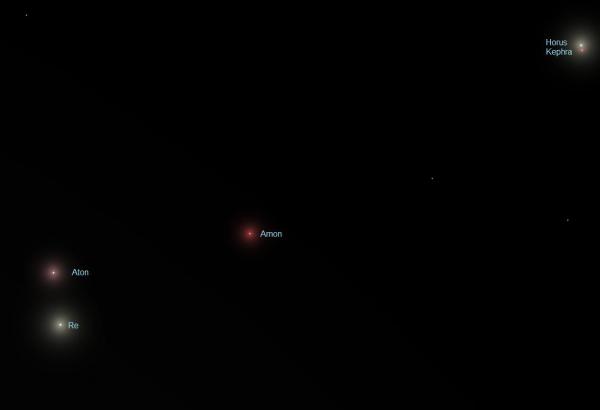BY LETTER
Fons Luminis (Xi Ursae Majoris)
Galactography > Regions of Space > Inner Sphere
Galactography > Sephirotic Empires > Solar Dominion
Galactography > Systems and Worlds > Systems & Worlds E - F
Galactography > Sephirotic Empires > Solar Dominion
Galactography > Systems and Worlds > Systems & Worlds E - F
The Capital of the Solar Dominion | |
 Image from Steve Bowers | |
| The Sun Pyramid at Focus on Raphael is always directly below the red dwarf star Aton. Also in the sky is the primary, Re (Alula Australis Aa) | |
Fons Luminis - Data Panel | |
| System | Names: Fons Luminis, Hesperia Components: 5 1) Ra (Xi Ursae Majoris Aa) 2) Aten (Xi Ursae Majoris Ab) 3) Horus (Xi Ursae Majoris Ba) 4) Khepri (Xi Ursae Majoris Bb) 5) Amun (Xi Ursae Majoris C) Location: - Distance from Sol: 28.49 ly (J2000) - Constellation: Ursa Major |
|---|---|
| AB binary orbit | Orbital characteristics: - Average separation: 21.88 AU - Orbital period: 59.89 years - Eccentricity: 0.404 |
|---|---|
| Ra | Names: Ra, Alula Australis, Xi Ursae Majoris Aa, 53 Ursae Majoris Aa, Gliese 423 Aa (GJ 423 Aa), HD 98231, HR 4375 Physical characteristics: - Mass: 0.98 x Sol - Radius: 1.02 x Sol - Temperature: 6,005 Kelvin - Luminosity: 1.219 x Sol (bolometric) - Spectral type: F8.5 V - Age: 5 billion years |
| Aten | Names: Aten, Xi Ursae Majoris Ab, 53 Ursae Majoris Ab, Gliese 423 Ab (GJ 423 Ab) Physical characteristics: - Mass: 0.38 x Sol - Radius: 0.32 x Sol - Temperature: 3,560 Kelvin - Luminosity: 0.015 x Sol (bolometric) - Spectral type: M2 V - Age: 5 billion years |
| A binary orbit | Orbital characteristics: - Average separation: 1.682 AU - Orbital period: 1.834 years - Eccentricity: 0.61 |
| Horus | Names: Horus, Xi Ursae Majoris Ba, 53 Ursae Majoris Ba, Gliese 423 Ba (GJ 423 Ba), HD 98230, HR 4374 Physical characteristics: - Mass: 0.88 x Sol - Radius: 0.92 x Sol - Temperature: 5,692 Kelvin - Luminosity: 0.800 x Sol (bolometric) - Spectral type: G2 V - Age: 5 billion years |
|---|---|
| Kephri | Names: Kephri, Xi Ursae Majoris Bb, 53 Ursae Majoris Bb, Gliese 423 Bb (GJ 423 Bb) Physical characteristics: - Mass: 0.38 x Sol - Spectral type: D - Age: 5 billion years |
| B binary orbit | Orbital characteristics: - Average separation: 0.053 AU - Orbital period: 3.981 days |
| Amun | Names: Amun, Xi Ursae Majoris C, WISE J111838.70+312537.9 (WISE 1118+3125) Orbital characteristics: - Average separation: 4,100 AU Physical characteristics: - Mass: 31 x Jupiter - Radius: 65,000 km (0.91 x Jupiter) - Temperature: 567 Kelvin - Luminosity: 0.00000078 x Sol (bolometric) - Spectral type: T8.5 - Age: 5 billion years |
|---|
| Raphael | Xi Ursae Majoris Ab (Aton) I Tidally locked planet orbiting Aton, within the lifezone of Re. Terraformed since the Age of Expansion. Main urban center: Focus. Otherwise largely rural. Major government and religious center. |
|---|---|
| Kephra Orbital | A centre for godtech manufacturing. Finance, transport, media, pilgrimage. Main clusters: Khylia Cluster, Fartram Nexus, Bui Je Interstellar Cluster. |
| Horus Orbital | Amat production, weylforges and wormhole storage during interstellar transit. |
| Amon Orbital | Center for heavy industry, shipyards, star lifting and megascale constructions. |
| Re Orbital | Orbital band orbiting 0.5 AU from Re. AI clusters, nanotech support webs, defense. Main clusters: Lux 4, Radiosity Pure, Iohannis-Farad Cluster. |
| Population: | Total 14.4 billion sentients Raphael total 7.1 billion Focus 0.3 billion Rural areas on Raphael 6.8 billion orbitals Kephra 1.0 billion Horus 0.04 billion Amon 0.02 billion Re 6.3 billion Other <0.01 billion |
| Main languages: | Solarese (Edenese/Anglish derived language, also called Solarian) |
| Main species and clades: | AI 50% (mainly located in Re Orbital) superior 15% cyborg 14% vec 10% rianth 9% baseline 2% alien 0.01% |
| Main Industries: | Interstellar governance services, wormhole engineering, interstellar transport services, finance, forecasting, religious technology and pilgrimage. |
 Image from Steve Bowers | |
| The five stars of the Xi Ursae Majoris (Alula Australis) system | |
Fons Luminis is the capital of the Solar Dominion, and a significant wormhole junction, with connections to two side branches in addition to the main Nexus. It is a quintuple star system: a Vesperian class world Raphael orbits in a tidally locked manner around Aton, a red dwarf which orbits the bright G0 star Re which is the primary source of warmth. Orbiting Re and Aton are the three outer stars, the K2 star Kephra which orbits with the G2 star Horus which in turn is closely orbited by a brown dwarf called Amon.
The climate of Raphael is variable. There is a 3 month period due to the motion around Aton, a 1.2 year period due to Aton's motion around Re and a 60 year period due to the outer triad. When the planet was first colonised it was a lifeless desert, but due to immense terraforming efforts where massive amounts of material were brought in from other systems it has been turned into a paradise. The costs have been enormous and in order to keep the climate, biosphere and geosphere stable there is a dense angelnet everywhere subtly manipulating things. Nothing can occur on Raphael without being directly known by its AIs or the Lord of Rays.
The capital on Raphael is known as Focus, located at the subsolar point where Aton always stays in zenith. At the center is the grand pyramid where the principle avatar of the God-Emperor resides. Surrounding it are major government buildings, historical monument and the central temples.
Outside Focus, Raphael is mainly pastoral, with a population distributed evenly across the surface. Communications are excellent, and despite the lack of a beanstalk ground-orbit transports are cheap and frequent.
Each of the stars is surrounded by a massive shell of power collectors and processors, which together contain part of the great distributed mind of the Archai which rule the Solar Dominion.
Orbiting in great bands around Kephra, Horus and Amon are orbital factories, habitats and defense installations. Further out is the Outsys, a major center of trade and the location of the system's three wormholes. Transports between Raphael and the Outsys wormholes are frequent and in general take 13 days or so, depending on orbital configuration (there are many in-system microscale Hayward wormholes, but they are only for transapient use).
Related Articles
Appears in Topics
Development Notes
Text by Anders Sandberg
additional material by Steve Bowers and The Astronomer, 2021
Initially published on 23 October 2008.
additional material by Steve Bowers and The Astronomer, 2021
Initially published on 23 October 2008.






